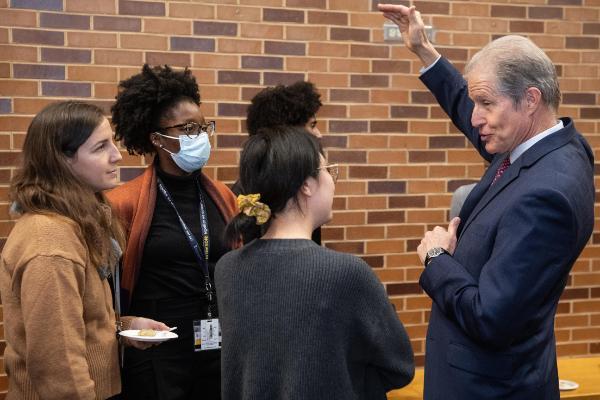Placebo Beyond Opinions Center Lecture Posits That ‘Placebos Can Improve Almost Any Condition You Can Name’

Language matters. That was the premise of a lecture on “Translating the Science of Placebo into Medical Practice” by Wayne Jonas, MD, president of the Healing Works Foundation and a widely published investigator, practicing family physician, and professor of medicine at Georgetown University in Washington, D.C., and at Uniformed Services University of Health Sciences in Bethesda, Maryland.
Jonas presented during the first 2023 - 24 lecture in December of the Placebo Beyond Opinions Center at the University of Maryland School of Nursing, addressing an in-person audience of faculty, staff, students, and researchers—and an international audience that tuned in virtually.
The event served as the launch of Placebo Effects: Through the Lens of Translational Research, a newly released book edited by Luana Colloca, Jason Noel, Patricia D. Franklin, and Chamindi Seneviratne, all members of the University of Maryland, Baltimore (UMB) community. Colloca, MD, PhD, MS, professor and an inaugural UMB-University of Maryland, College Park MPower Professor, is director of the PBO Center, which aims to advance unbiased knowledge on placebo effects through interdisciplinary investigation and further development of a robust placebo-focused research program.
Jonas, whom Colloca has known and collaborated with for years, also contributed to the book. “We wanted a rigorously scientific yet accessible book, with topics for everyone: nurses, doctors, therapists, pharmacists, psychologists, students, faculty, scientists,” Colloca said. In digital form, the book is available for free on Oxford Academic’s website and covers topics such as:
- the culture and anthropology of placebo effects
- placebo effects in psychiatry and family practice
- molecular and brain mechanisms of placebo effects
- placebo and COVID-19
- clinical notes and digital therapeutics
- and virtual reality and placebo matters.
Jonas, Colloca said, “has been promoting placebo research for decades. He was the first to recognize, along with anthropologist Daniel Moerman, that the meaning response is the trigger for placebo effects in human patient-doctor interactions.”
During the December lecture, Jonas posited that “placebos can improve almost any condition you can name.” He discussed three core mechanisms of placebo research that define the placebo effect, six clinical practices that draw on those placebo mechanisms, implications of placebo research on other areas of research, and tools for incorporating placebo mechanisms into clinical practice.
“Placebo science reveals a lot of what current medical science conceals,” he said, indicating that while placebo science is widely considered a relatively recent area of research and practice, its roots reach back to Plato, and the National Institutes of Health has been involved for the past quarter century.
The three core, durable mechanisms of placebo, which have a direct application in practice, are:
- expectation or belief
- social learning or rituals
- and conditioning or training—how we get the body to respond to expectation, essentially.
He presented a case study involving Joe, a Navy veteran, who started having back pain after a motor vehicle accident 15 years prior; his goals were simply to be able to play golf and interact with his grandchildren. He’d seen a cadre of providers; tried all the recommended treatments, both pharmacological and non; and eventually found Jonas, whom he asked, “Is acupuncture all placebo?”
Jonas said that while traditional treatments are focused on content, placebo approaches are based on context: Is there meaning attached to the treatment? In studies, he said, “those who had a higher expectation had better outcomes; those who believed it would work had a more positive effect.” In fact, he stated that about 30% - 70% of patients receiving placebo in studies had a healing response. Sham acupuncture worked just as well as real acupuncture in a large study on back pain comparing acupuncture with conventional therapies.
The other point that Jonas made is that Joe had experienced a repeated nocebo effect during his previous treatment; that is, that negative expectations caused a less positive outcome than otherwise might have been the case. “A lot of social learning has been embedded unconsciously: how treatment effects are described, publicity in the media, prior experiences, cultural expectations and assumptions,” Jonas said. Joe had been told that treatments had “failed,” that he had a “chronic disease.” In fact, he said, the word “placebo” itself has connotations of not being effective, which can impact results.
Jonas placed emphasis on the power of words. “There’s lots of research on this,” he said. That research revealed that more than 60% of those who had had a positive consultation reported that they no longer had the health issue, while fewer than 40% of those who had had a negative consultation reported they no longer had the issue. “Language matters,” Jonas said.
Prior to Jonas’ lecture, in her welcoming remarks, Yolanda Ogbolu, PhD ’11, MS ’05, BSN ’04, NNP, FNAP, FAAN, the Bill and Joanne Conway Dean of the University of Maryland School of Nursing, said the event reflected the School’s “commitment to the enormous benefits of interprofessional research, education, and practice — as a School of Nursing and as a University.”
“Certainly, it is that commitment to ‘translation into practice’ that is at the heart of nursing science and our work as a School of Nursing: advancing practice, shaping health policy, and impacting the health of individuals,” Ogbolu said. “We often refer to this translational work as moving from bench to bedside and to community — with the goals of having a positive and lasting impact on the day-to-day well-being of individuals.”
You can watch a recording of the “Translating the Science of Placebo into Medical Practice” lecture. Use password M?JKNE3k.
The next PBO Center lecture will be on “Resilience and Impact on Behavior and Outcomes,” presented by Barbara Resnick, PhD ’96, RN, CRNP, FAAN, FAANP, on Feb. 21 in a hybrid format.